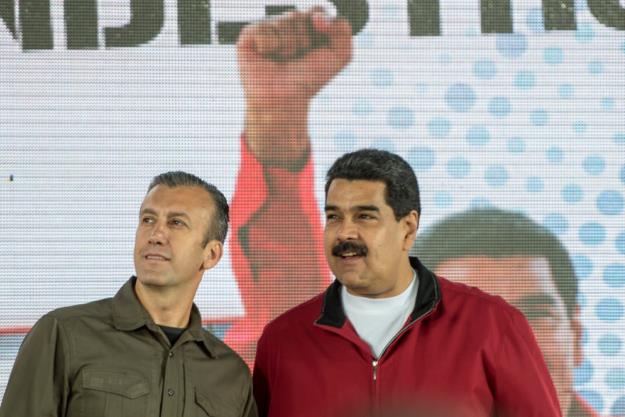This story has been updated.
Venezuela is mired in a four-year recession, with its currency reserves at their lowest point in decades, triple-digit inflation and a deepening humanitarian crisis that includes shortages of food and medicine. The outlook for the country’s economy worsened on November 13, when two leading credit ratings agencies, Standard and Poor’s and Fitch, declared the country and its state-run oil company, Petroleos de Venezuela (PDVSA), respectively, to be in default. The announcements came after Venezuela missed $280 million in interest payments due on bonds.
Also on November 13, the European Union approved an arms embargo against the country, and is preparing sanctions following irregularities in last month’s elections. The UN Security Council convened an important meeting with OAS Secretary General Luis Almagro and Venezuelan civil society to discuss the humanitarian crisis. And Maduro’s government hosted bondholders in Caracas for a last-minute meeting to renegotiate the terms of roughly $60 billion in external bonded debt owed by the government and PDVSA. However, according to investors present, no details of restructuring were discussed during the meeting, which lasted just 30 minutes.
Ahead of the November 13 meeting with investors, AQ spoke to Russ Dallen, an international lawyer, managing partner at Caracas Capital Markets investment bank, and owner of the Latin American Herald Tribune, about his expectations for the meeting and the ramifications of a default.
AQ: Where does Venezuela’s debt situation stand?
Everything seems to be confused. On November 10, a grace period expired on a bond payment by the state electricity utility Electricidad de Caracas, and there was confusion over whether that payment was made. So the markets have been confused. I suppose we’re entering a similar situation because they haven’t said whether they’ve paid these three bond payments that came due over the weekend. But because Saturday and Sunday are not business days they essentially have until the end of Monday to pay them off.
AQ: What is your take on the government’s strategy heading into Monday’s meeting?
It’s almost like things have been set up to fail, given the lack of information about the meeting. Additionally, the government tapped Vice President Tareck El Aissami to lead the negotiation, with the finance minister and PDVSA CFO Simon Zerpa as the leading official present. Both have been sanctioned by the U.S. Treasury, which has created confusion for bondholders who have not been sure if they can attend. On Saturday, the U.S. Department of Treasury issued an explainer saying that bondholders could participate in the negotiations on licensed bonds so long as sanctioned individuals – Zerpa and El Aissami – are not involved.
AQ: How could Maduro gain if the talks break down?
There’s been a perception that the Maduro government was going to have the talks fail and blame a default on U.S. sanctions, which currently prevent Venezuela from making new debt. But the Treasury Department in recent days has said that the U.S. would consider licensing new bonds if they are approved by the Venezuelan National Assembly, which Maduro has been thwarting at every opportunity. This gives the opposition something to go to the government with and say, “If you recognize the National Assembly and treat us with respect we might be willing to do this.” Interestingly, it’s turned the sanctions into a great negotiating tactic. It’s a great flanking maneuver from the U.S. government.
AQ: The opposition has criticized the Maduro government for prioritizing debt payments when there’s a shortage of food and medicine. If the government does default, would that realistically help it provide these necessities?
It will in some ways. (OAS Secretary General) Luis Almagro was asked the same question in a hearing before the Senate Foreign Relations Committee, and his answer was that the government was not giving those things to the people anyway. Any money they get they’re not spending on the people.
AQ: If Venezuela defaults on the interest payments it owes, what are the short-term implications? Why should people who aren’t bondholders care?
After a default, the real ramifications would be a drop in oil production and a drop in the cost of Venezuelan oil. Venezuela is dependent on foreign money to develop its oil resources. If it becomes incapable of accessing, exploring and producing this resource, the world itself will be hampered because oil prices will go up and development will become more expensive.
Once you have defaulted, creditors become aggressive in their tactics to collect. Argentina set the modern-day example of what can happen. You had people following then-President Cristina Fernández de Kirchner around looking to seize her jet. An Argentine naval ship was held in a port in Ghana for two months after a hedge fund demanded a payment of $20 million. In this case, you could see PDVSA ships, or ships carrying Venezuelan oil, stopped on the high seas. You’re going to see the prices that people pay for Venezuelan oil go down because there’s the risk that their ship could be stuck in a port. Anyone that buys Venezuelan oil is going to demand concessions because of the danger of legal problems. This could further exacerbate Venezuela’s economic crisis.
This story was updated to include the announcement that the state and PDVSA were downgraded to default-level credit ratings on November 13.
—
O’Boyle is an editor for AQ









